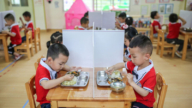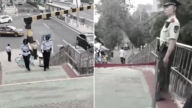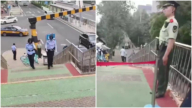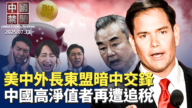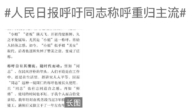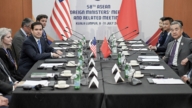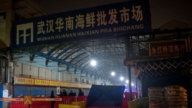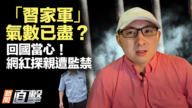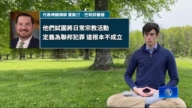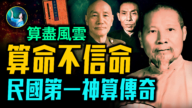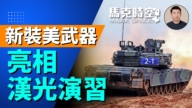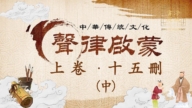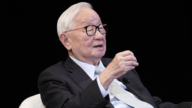【新唐人2013年06月27日讯】中共中央政治局举行一连四天的会议,意外的是,官方媒体报导,中共总书记习近平要求政治局成员执行集体的决策、并坚持重大问题要按规定请示报告。官方的公开报导,显示习近平对政治局的内讧问题甚为窝火,有意藉民意、舆论施压。
习近平在会议上表示:中央政治局成员“要带头自觉维护中央权威,在思想上、政治上行动上同党中央保持高度一致,……认真贯彻执行中央政治局作出的决定决策,坚持重大问题按规定请示报告。”
香港《苹果日报》评论文章说,习近平的要求自然不会无的放矢,表明政治局委员存在四大问题:未同中央齐心、未守党纪、未执行集体决定、未请示报告。
报导说,近期,中共左右派论战、及“钱荒”等问题激烈,习近平不惜将政治局的矛盾公开化,既显示问题之严重,也显示习之强硬。习近平不只是警告现任领导人,也是警告他们背后的元老。
原国务院农村发展研究中心研究员姚监复:“中共的事就是你强调什么,就是存在什么问题。你说中国共产党跟苏联共产党是磐石般的团结,那意思就是不团结,就是需要加强。”
原北京“社会经济科学研究所”所长陈子明认为,从习近平这番话来看,他肯定是针对某一个或某些个势力。而且,肯定是有人不请示汇报了。
原北京社会经济科学研究所所长陈子明:“比如前一段宪政的、反宪政这些言论,怎么评价可能会有分歧。薄熙来审判多少年?怎么审?周永康那个案子,要不要进行下去?这些都会有分歧。”
另外,大陆学者郑志遥认为,习近平的这番话,公开暴露了中共一直存在的“政令不出中南海”问题。
大陆学者郑志遥:“还有很多问题就在于,他们上面的意见和分歧都是非常明显的。为什么会出现意见分歧?就是利益的纠葛,每个人背后都有一个利益集团,或者每个利益集团后面都站了一群既得利益者。他们叫特权阶层,新兴权贵。”
郑志遥表示,中共中央层面现在因为利益的原因,也有很多分歧。而现在,固然新的领导班子希望团结,但是共识还没有形成,因为着眼的利益点不一样。郑志遥说,习近平公开曝光高层矛盾,证明大陆的经济和社会形势已经严峻到不得不面对的程度了。
郑志遥:“习近平当然想流芳百世,但是有一部分人他们只想再过几天就行了。或者说这种模式就挺好。或者说你应该按照我们原来的计划,你现在怎么改变计划了?习近平说,你们原来的计划就是大家一起完蛋,然后我来给你们做一个标志性的悲剧性的人物。”
中国“复旦大学”图书馆馆长葛剑雄,也是全国政协常委,他表示,习近平对政治局以上官员提出规范要求,可以算是对他在今年两会提出的一个议案的回应。
复旦大学图书馆馆长葛剑雄:“在今年两会期间我曾经提出一个提案,就是要制定离任领导人的礼仪标准,我也注意到习近平在讲话中,对现任的领导人待遇,他提出来要制定规范,我想这一点这正是我们所希望的。”
葛剑雄今年在两会期间提出,“现在离任的国家领导人一、两百个,他们所享受的待遇,不能延及他们的子孙。纳税人的钱不能就这么花。”此提议被称之为两会最大胆的议案。
日本《朝日新闻》年初曾经报导,习近平就《南方周末》“新年献辞事件”批评刘云山,要求宣传部门不要“添乱”。另外,香港《大公报》报导习近平在北京微服出巡搭出租车后,习也批评了中央办公厅主任栗战书“一蠢、再蠢”。而《光明日报》指摘“豪车禁挂军牌是制度的倒退”,中共喉舌《新华网》接连发文反驳说“越反越腐、官员大多是贪官”。而这些,都被外界视为是在和习近平治军、反贪唱反调。
采访编辑/秦雪 后制/葛雷
Xi – Putting Pressure On Politburo
The Chinese Communist Party (CCP) Central Politburo
meeting continued for four days.
Surprisingly, official media reported that General Secretary
Xi Jinping required that Politburo members perform collective decision-making,
report back and adhere to the set provisions on major issues.
Official reports showed Xi Jinping unhappy with the Politburo
infighting crisis, and intended to use public opinion to put pressure on them.
Xi Jinping said at the meeting, that Politburo members should
“consciously safeguard the authority of the central CCP,
be highly consistent with the Central Committee in ideology
and politics, and seriously implement the decisions of the
Central Politburo, and report back on major issues."
Hong Kong’s Apple Daily review article said that
Xi Jinping’s requirements were not a surprise,
indicating the four major crisis areas existing
within the Politburo:
not being in line with the central committee, not keeping
discipline, not executing collective decisions, and failure to consult and report.
It is reported that, recently, the CCP’s Left and Right factions’
debate and money shortage were serious issues
Xi Jinping brought the conflict at the Politburo out into the
open, showing the seriousness of the problem, as well as how tough he was.
Xi Jinping is not only warning the current leaders,
but also the veterans behind them.
Yao Jianfu, the former researcher of State Council
Development and Research Center of Rural Development said:
“For the CCP, what it emphasizes is where the problem exists.
If it says the CCP and the Soviet Communist Party is
rock-solid united, it obviously means they are not united, and needs to be sorted out."
Former director Chen Ziming of Beijing’s Socio-Economic
Sciences Research Center believes that from Xi’s words,
he is definitely pointing at one or more forces.
It is certain that some people did not consult or report.
Former director Chen Ziming in Beijing: “For example,
constitutional words and terms, may have
big differences in interpretation.
How many years has Bo Xilai been sentenced?
How do you judge him?
How about Zhou Yongkang’s case?
There will be differences."
In addition, Zheng Zhiyao, a scholar in China believes that
Xi Jinping’s remarks publicly exposes the CCP’s problem of:
“decree gets no further than Zhongnanhai".
Zheng Zhiyao: “The problem is that their views and
disagreements are very obvious.
Why is there disagreement? It is the clash of interests.
Everyone is related to an interest group,
or every interest group has a vested interest.
They are called the privileged class, the emerging elite."
Zheng Zhiyao said the CCP Central Committee now have
many conflicts because of interest factors.
Of course, the new leadership team hopes to have unity,
but consensus has not yet formed,
because the focal point of interests’are so divergent.
Zheng Zhiyao said Xi Jinping’s publicly exposing
high-level infighting, proves that
the economic and social situation in China
has become too dire to be ignored.
Zheng Zhiyao:"Xi Jinping certainly wants to have fame,
but there are some people who just want to live for a few more days.
Or they think this model is very good. Or you should
follow the original plan, how could you change plans?
Xi Jinping said that everyone will be finished if the old plan
is followed, and then he becomes an iconic tragic figure."
Librarian Ge Jianxiong in Fudan University,
also a CPPCC Standing Committee member said:
Xi’s requirements of officials above Politburo level,
can be regarded as a response to the motions passed during the two sessions this year.
Librarian Ge Jianxiong: “During the two sessions this year,
I made a proposal to develop standards of decency of the outgoing leaders.
I also noticed that in his speech, Xi Jinping proposed to
introduce reforms in the treatment of the current leaders,
I think that this is what we want."
Ge Jianxiong mentioned during the two sessions this year,
“Now for over 100 retired leaders, the treatment they enjoy
cannot be extended to their descendants.
Taxpayers’ money cannot be just spent like this."
This proposal was the boldest motion of the two sessions.
Asahi Shimbun in Japan reported that: Xi Jinping criticized
Liu Yunshan on the Southern Weekend regarding New Year’s Message case,
requiring propaganda department not to “make trouble."
In addition, Ta Kung Pao in Hong Kong reported:
Xi Jinping went out in plain clothes by taxi in Beijing,
Xi also criticized the Central Office Director,
Li Zhanshu, “stupid, stupid."
Guangming Daily’s accusation: “luxury cars being banned
from having a military tag is retrograde."
The CCP mouthpiece Xinhua News reported “It becomes worse
when anti-corruption, officials are mostly corrupted."
These have been widely regarded as naysayers
against Xi’s military regulation and anti corruption.


